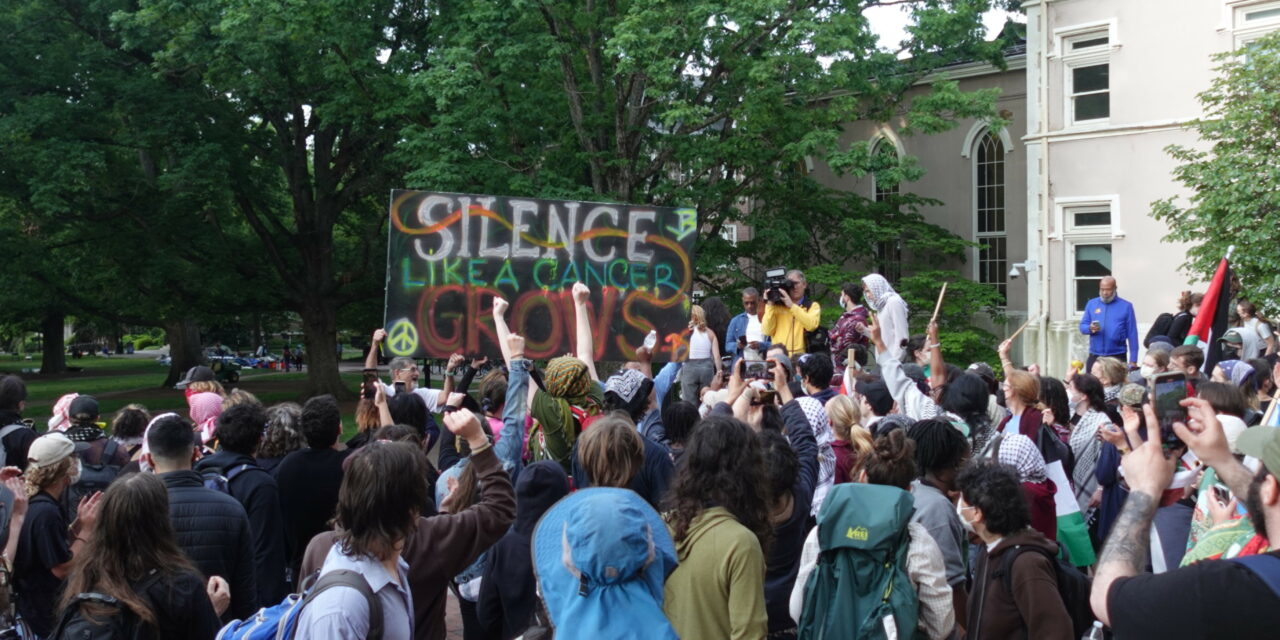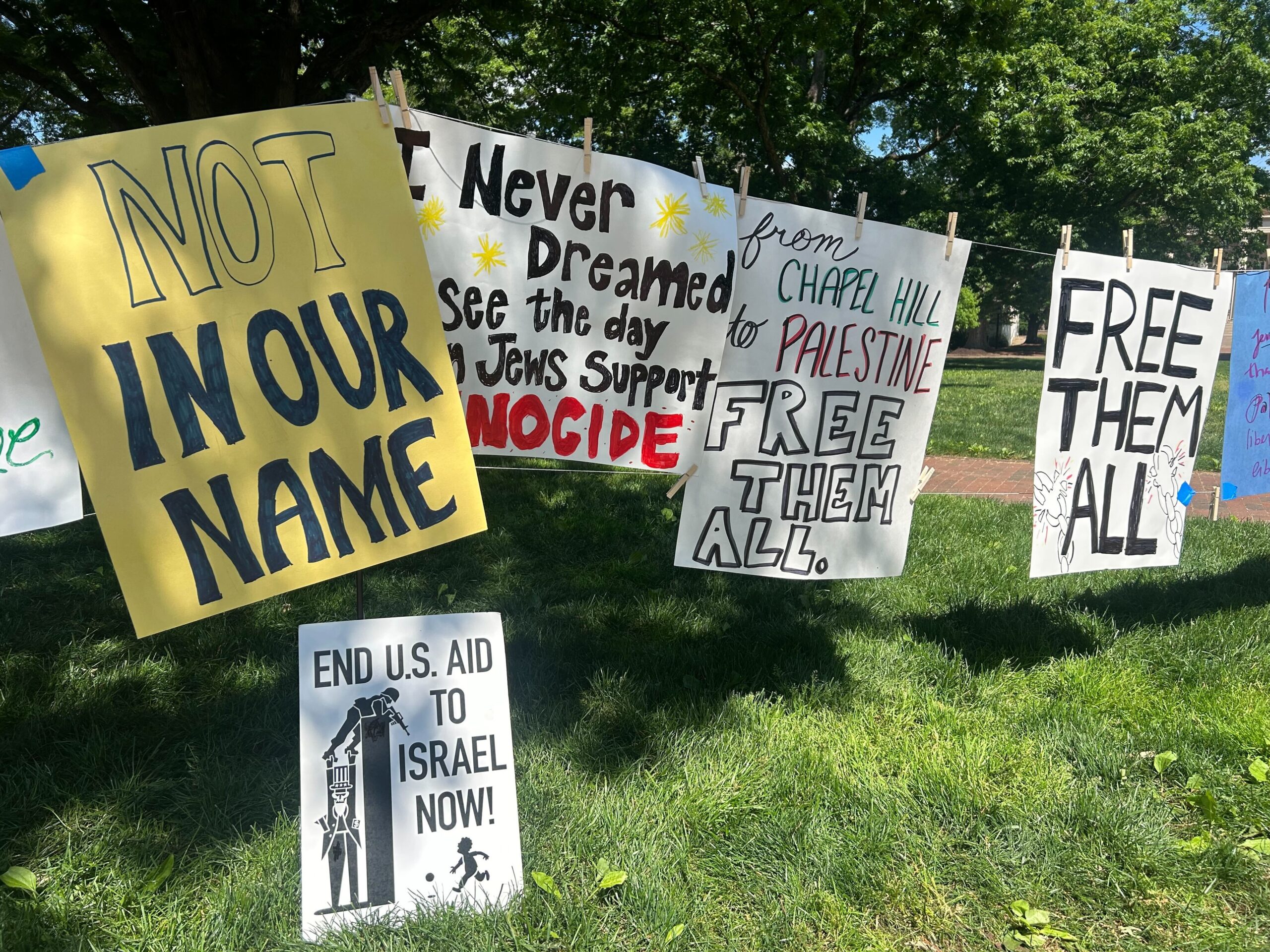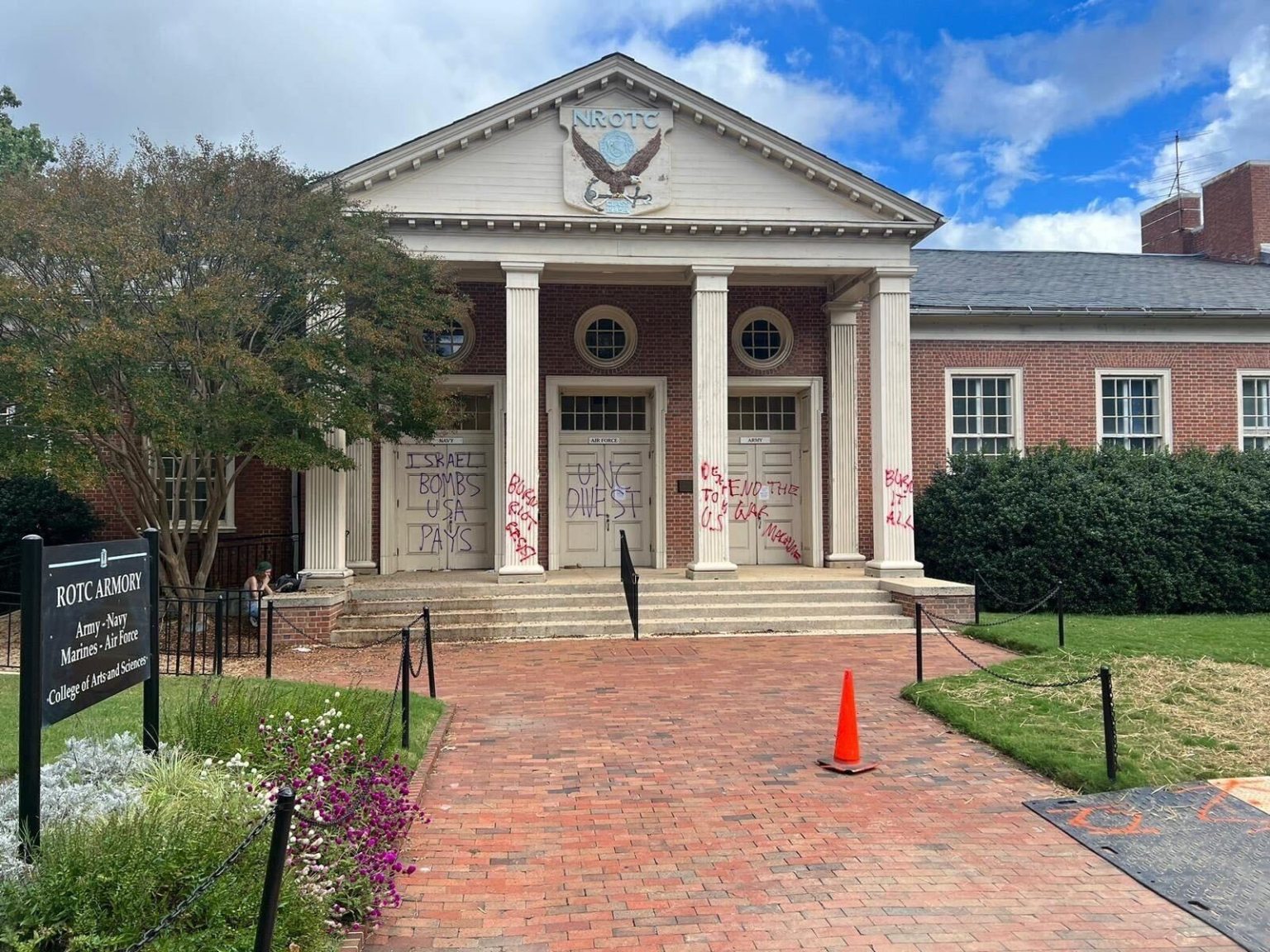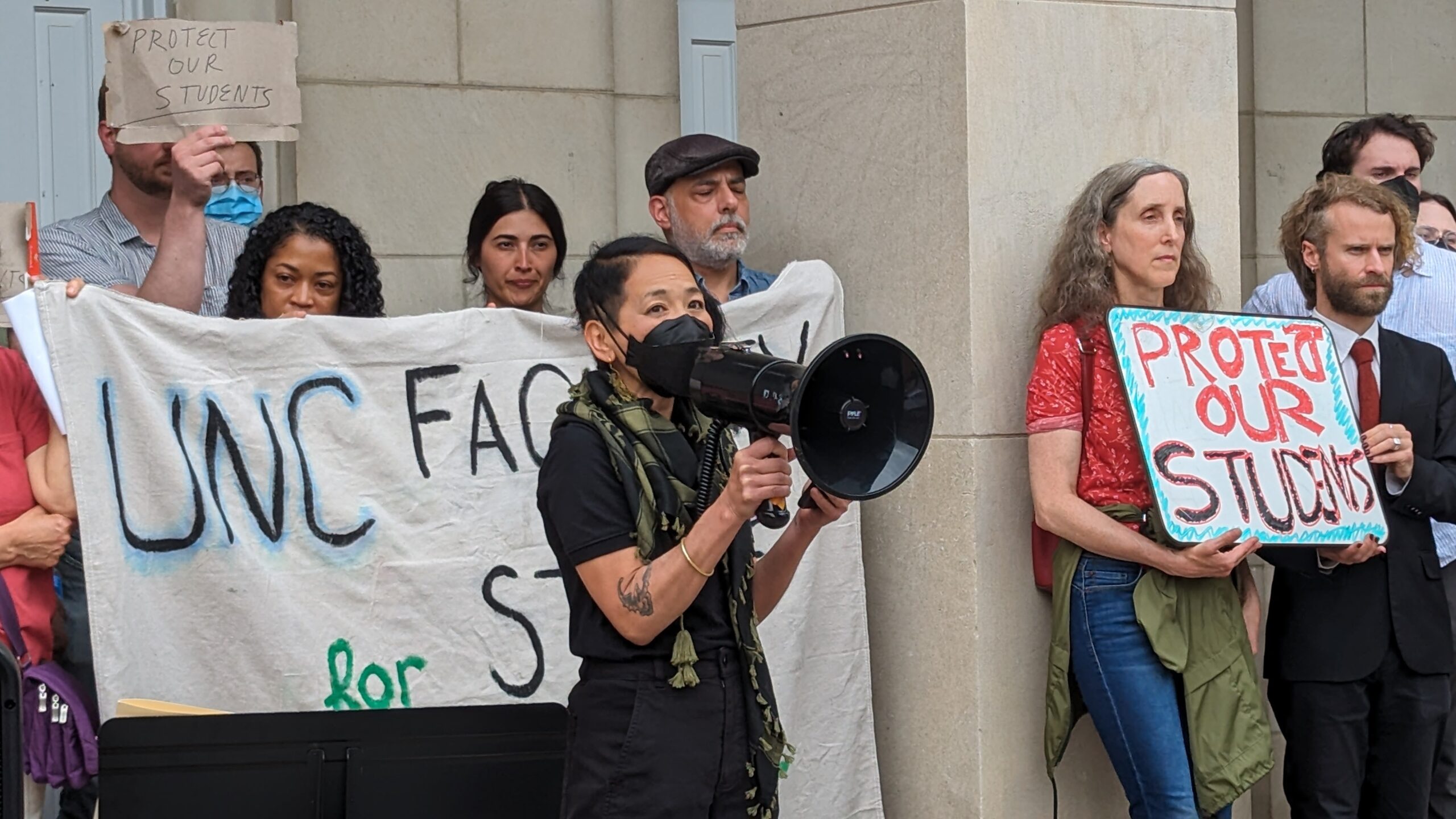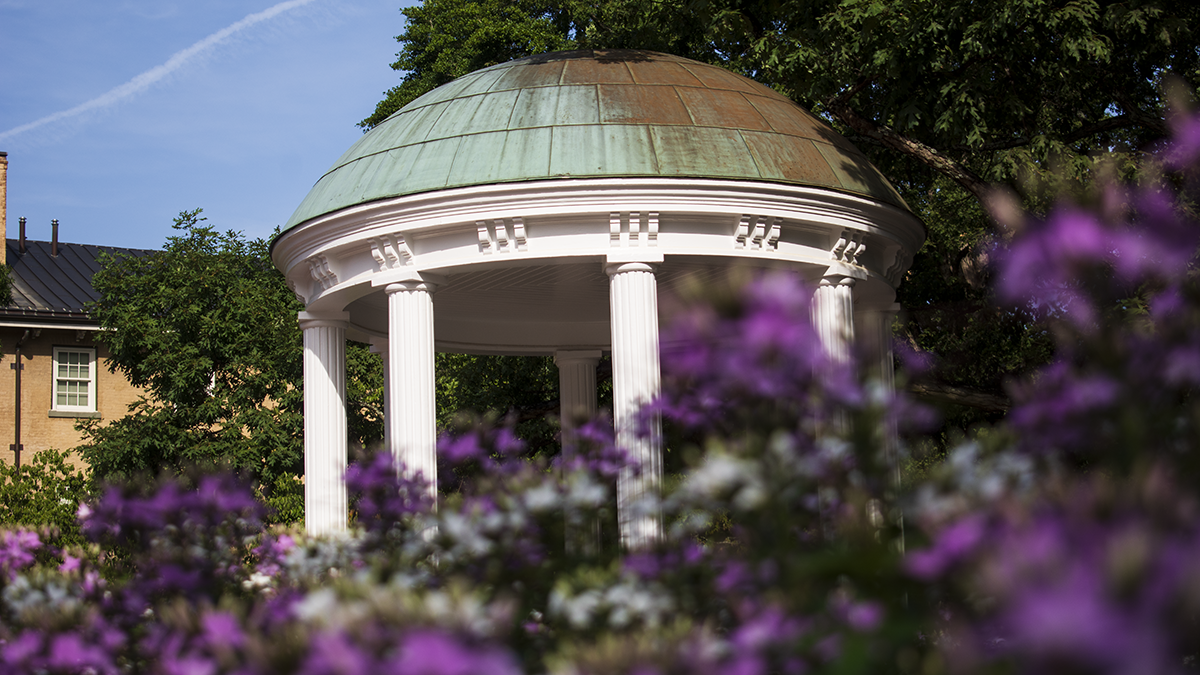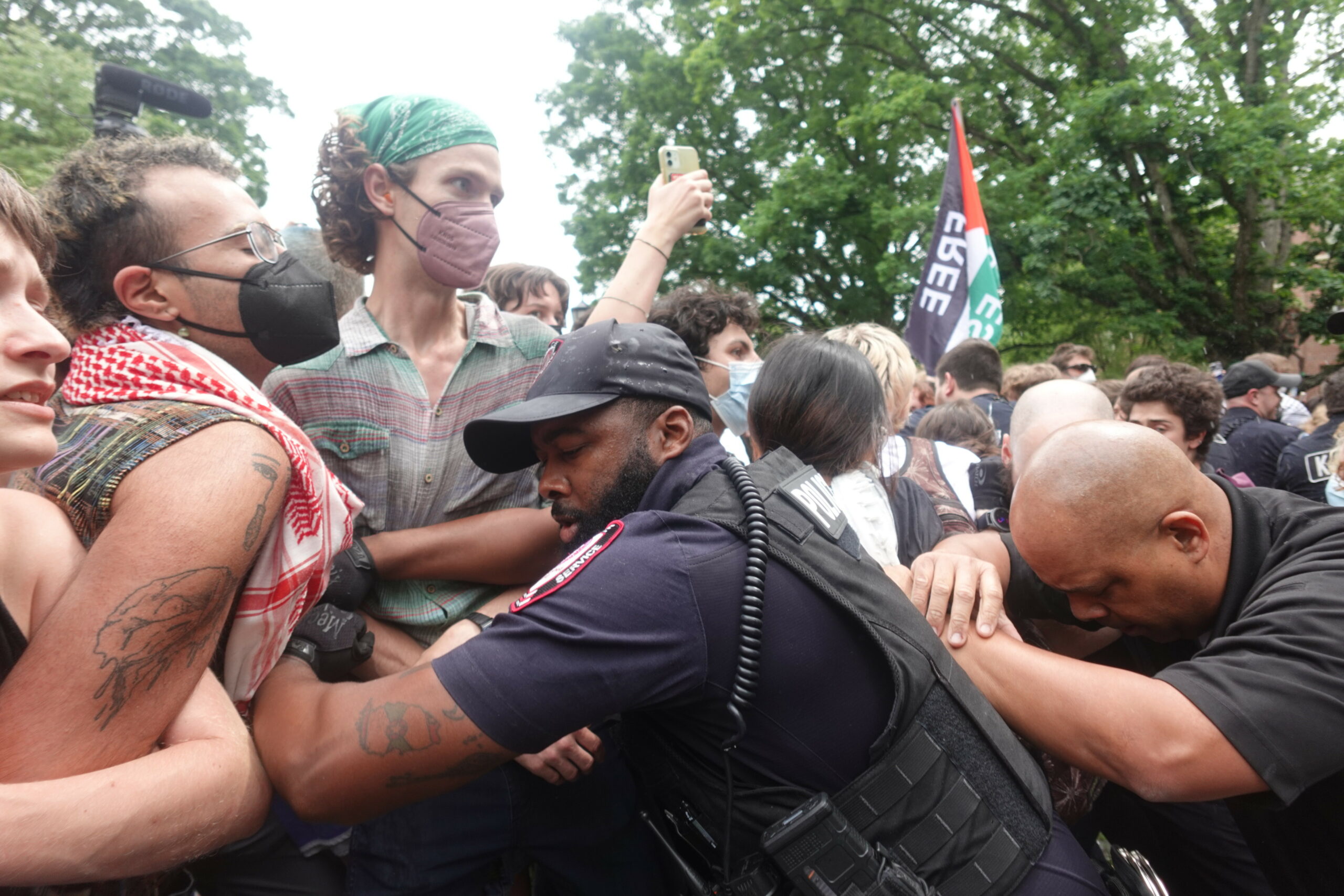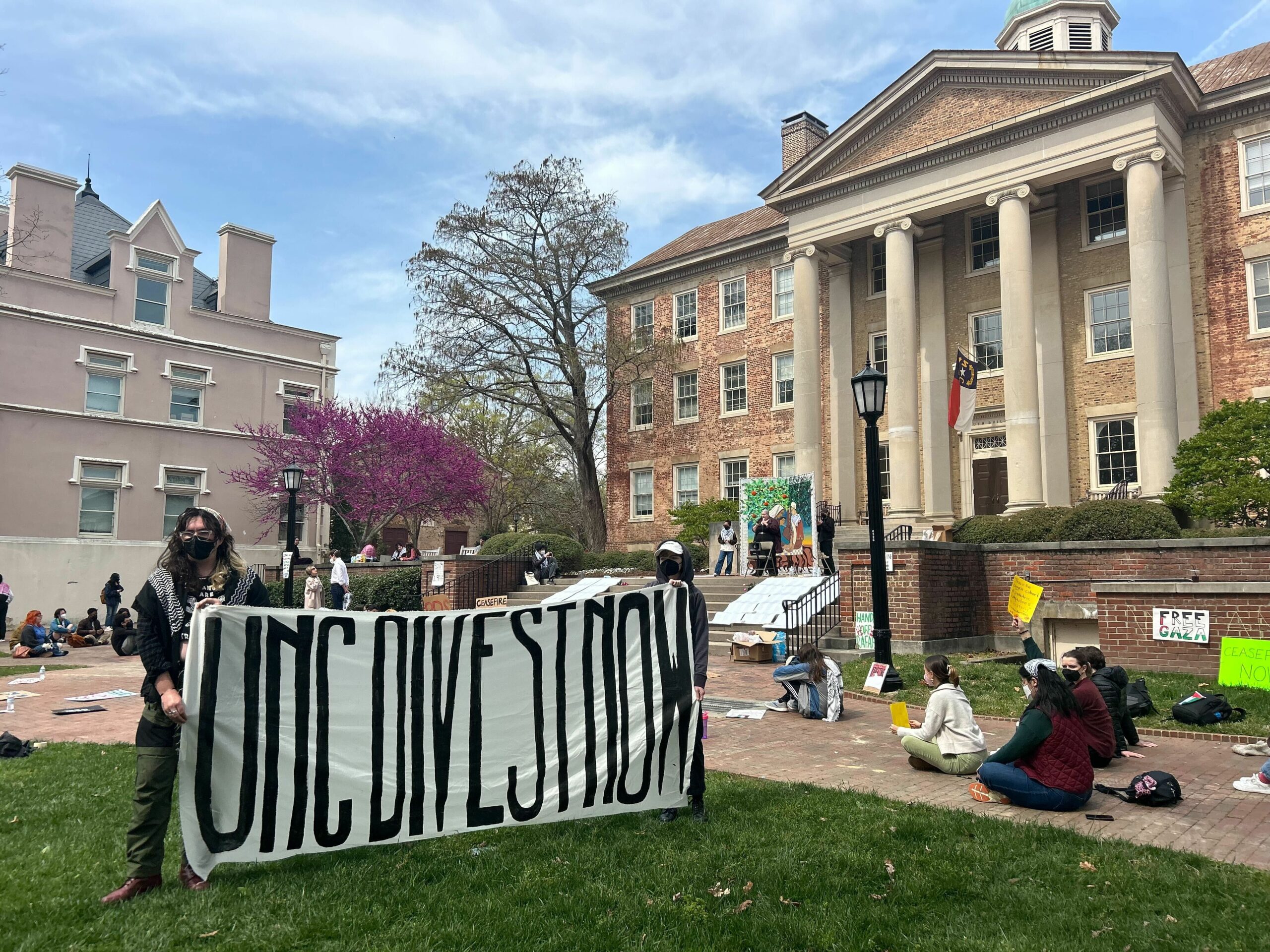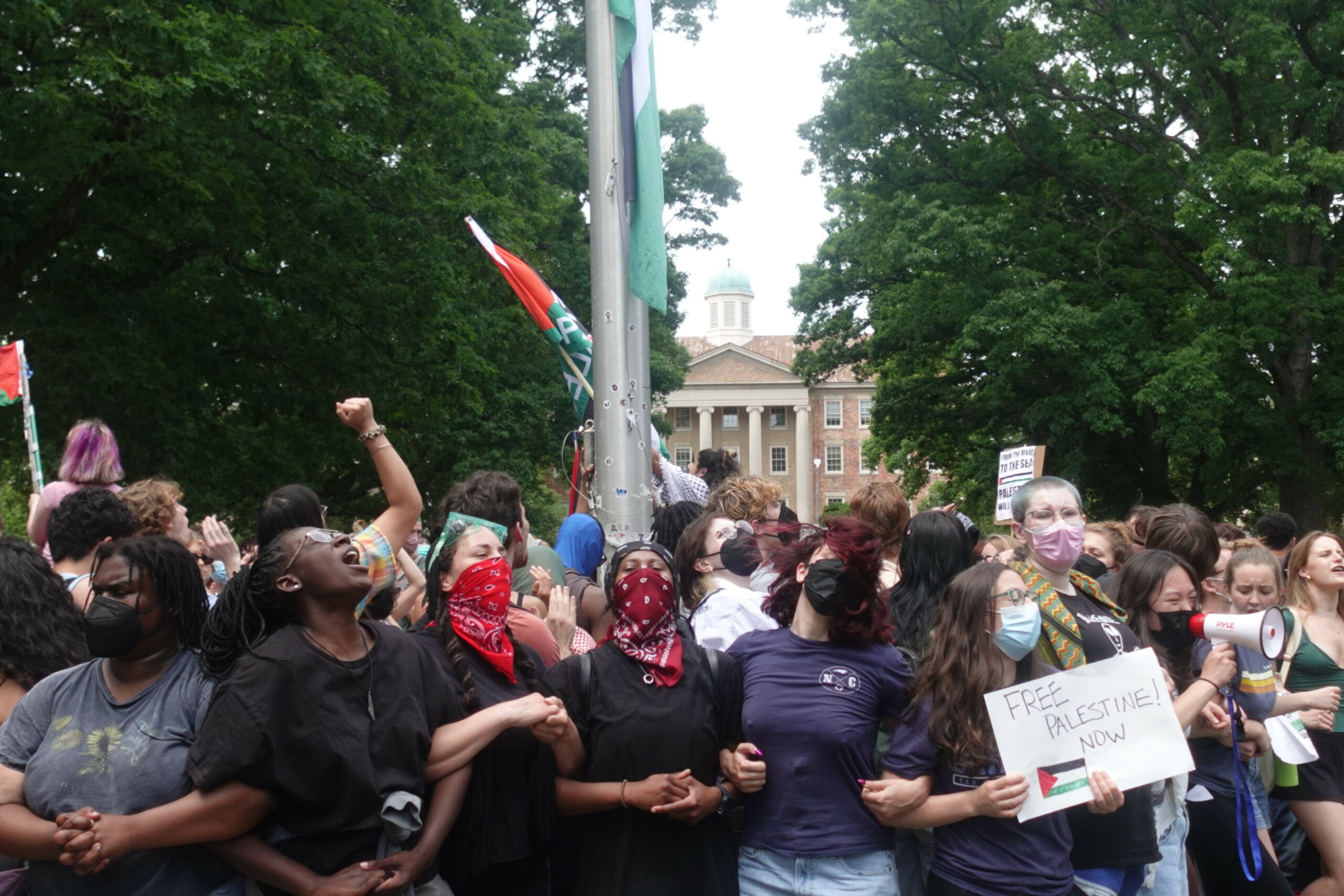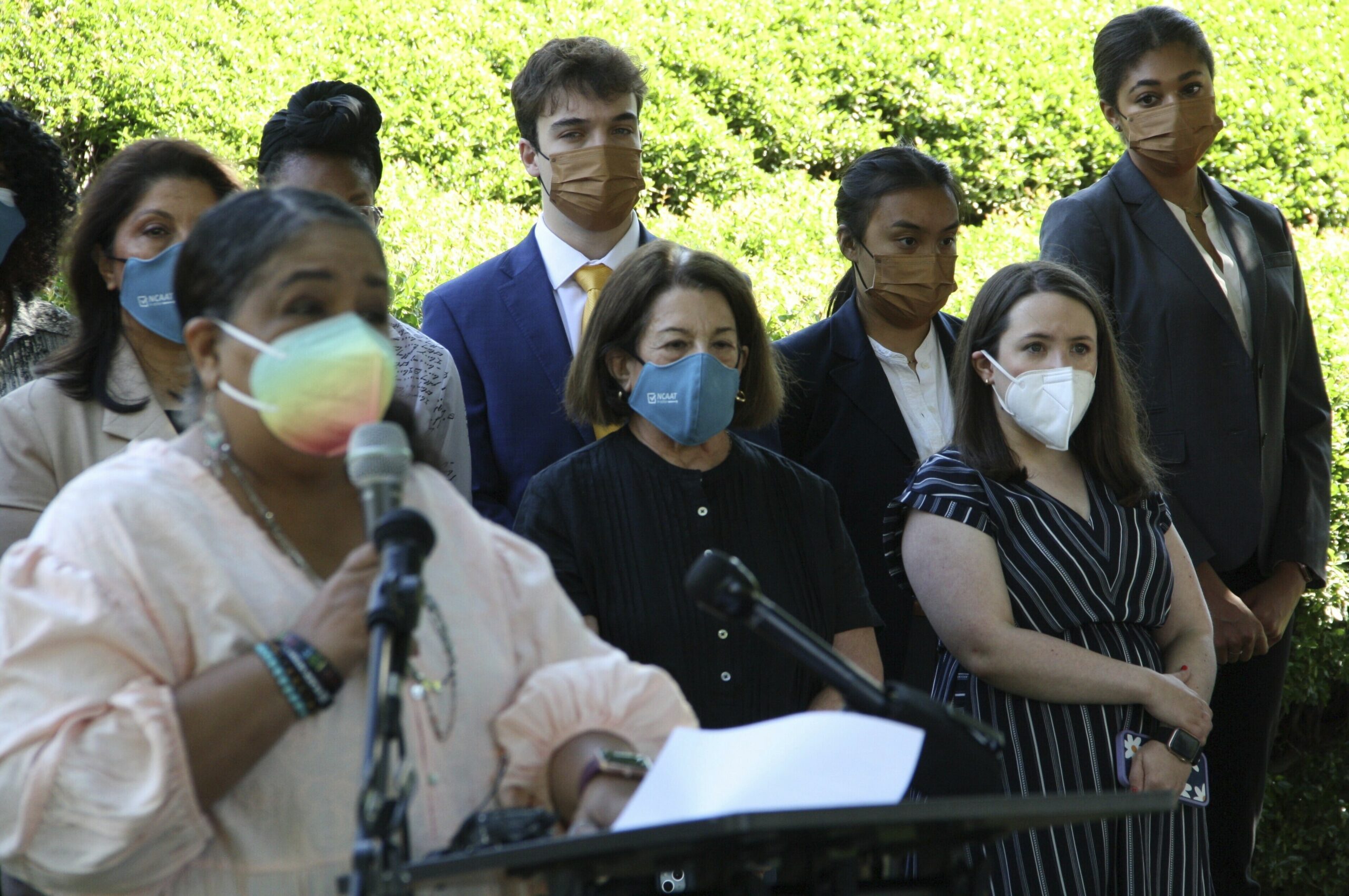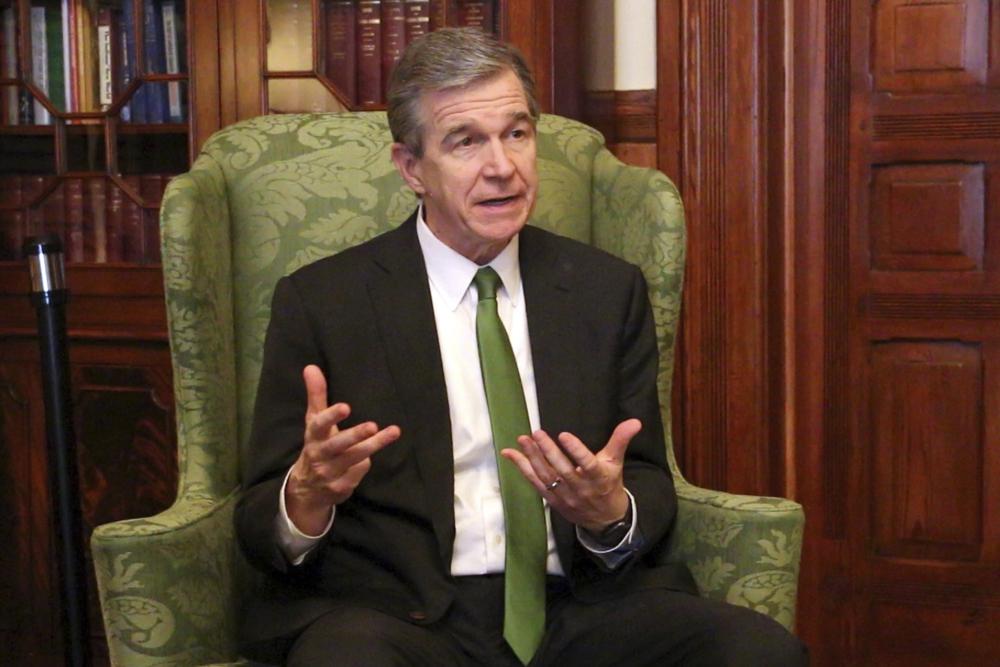UNC’s academic year wrapped up with several weeks of contentious demonstrations against the war in Gaza, culminating (but not ending) with a tent encampment that drew a forceful response from campus police.
Organized by Students for Justice in Palestine (SJP), the encampment went up on April 26 and lasted through the weekend, but police broke it up on the morning of April 30 – arresting three dozen people – citing violations of campus rules. Tensions escalated afterward, though, leading to a standoff that afternoon where protestors removed a U.S. flag from a pole and replaced it with a Palestinian flag.
UNC officials later issued a statement defending the police response, though the statement drew some pushback – in part because it attempted to justify the morning’s action by citing the flag incident, which didn’t take place until the afternoon. UNC’s statement also included details about a spike in antisemitic incidents on campus; there’s no direct evidence tying those incidents to the encampment itself, though they did occur around the same time.
Amidst those concerns, 97.9 The Hill’s Aaron Keck welcomed UNC graduate student and SJP organizer Hashem Amireh for a wide-ranging conversation.
Click here to listen to their full discussion. The transcript below has been edited for clarity.
Keck: Walk me through the weekend that led up to the police action that morning on April 30. What transpired?
Amireh: So the morning of Friday (April 26) is when the encampment was set up. Students came in around 9:00 a.m., put in tents. Eventually the university requested that the tents be taken down, as it violates the ‘temporary structures’ rules, (so) the tents were taken down initially – until Sunday evening, where they were put back up. During that time, there were a lot of discussions among the people at the encampment about the best strategy to make our voice heard. (And) there was also a lot of community building: we had religious service, we had a Shabbat service, we had Muslim prayers, teach-ins, all sorts of things.
Keck: So you knew, when you were putting the tents back up on Sunday, that that was going to lead to some consternation. What went into that decision?
Amireh: There’s a few things that are important. First, there’s the symbolism of the tents. Millions of Gazans have been displaced and are currently sleeping in tents – so the tents themselves, they have a symbolism that’s important. They’re also shelter, you know – we are here to stay overnight for days, for as long as it took for UNC to divest, and we needed protection from the elements.
Keck: So then the morning of April 30: I presume you get woken up at 5:30 with the message (to vacate). What happened then?
Amireh: I was actually awake at the time, in an adjacent building doing work … When we saw the notification, when we realized that something was happening, I stepped out and went around campus just trying to get an idea of the police movement – (but) by the time I got back, they had already been arresting people. There was a group of people just chanting at the police, and there was a group of people who stayed in the encampment, who did not want to be removed and were removed forcefully.
Keck: Where were you in that?
Amireh: I did not get arrested, I was on the side of the people who were chanting.
Keck: You were talking about strategy. Was there a strategic decision to have some people get arrested?
Amireh: I wouldn’t say there was a strategic decision to have people get arrested. What I would say is that people were there willing to get arrested if it came to that. That’s how I would phrase it…
In 1986 (during anti-apartheid protests on campus), that was the message they also put out: they said, “we don’t want to get arrested, but if we have to get arrested because the university’s going to remove us by force, then we will be there.” And back then, five students got arrested.
Keck: One of the things that UNC has pointed out is the fact that, of the folks who got arrested, some were students (but) a majority were not. The non-students who were in the encampments, who are they and where were they from?
Amireh: The majority were students, in the sense that they were either UNC, Duke, or NC State students. We didn’t bill this as a UNC-specific encampment; this was a Triangle encampment. And there were some community members. There’s definitely this narrative that these were outside agitators … but at the end of the day, this is a public institution. We all pay taxes. And community members also have a say in how this university functions, just like students do.
Keck: So that was in the morning, and then the afternoon was the demonstration that involved the Palestinian flag being put up. People conflate the two – but talk about the afternoon.
Amireh: Yeah, the university has been doing this thing where they’re trying to use the events in the afternoon as an excuse for what happened earlier in the day. That’s obviously not true, the timeline doesn’t line up. But what we also see is that (at) universities across the country, whenever they crack down, there’s always a lot of anger and people show up in larger numbers. So once we got everyone out of jail, by around 11 a.m., we scheduled a rally at noon – and then we had the largest turnout we’ve had at any pro-Palestine protest on campus, because people were mad, people were furious. (UNC) put up the barricades as we marched, and protesters – this was not planned – protesters broke the barriers, went into the middle and took down the (U.S.) flag and put up the Palestinian flag.
Keck: Who thought that was a good idea?
Amireh: Genuinely don’t know. Again, it was not planned. I was surprised. (But) I do want to point out something: the flagpole was in the middle of the encampment, it was not touched for four days – it was only taken down when the university actually exerted violence on the students. (And) strategically, maybe it didn’t help our cause, but this is a valid form of protest. From our point of view, Israel is committing a genocide – and the week before the flag was taken down, the U.S. government decided to give the Israeli military $17 billion. So taking down the American flag and putting up the Palestinian flag is a valid form of peaceful protest. And it was peaceful. The American flag was not desecrated. It was handed to the police, nothing happened to it – (in fact) I believe it was the same flag that was put back up later in the day.
Keck: We’ve been talking about April 30, but just in general, what are the goals of the movement on campus? What are you trying to achieve here in Chapel Hill?
Amireh: It’s the same goal as other universities, right? We want UNC to divest from businesses – either Israeli businesses, or businesses that work directly with the Israeli government, or do things in the settlements. And that can take different forms. Honestly, the initial goal is for (UNC) to disclose their investments so we can have concrete demands. UNC keeps it as much under wraps as they can. We know nothing about their investments. That’s the first step for us.
Keck: There was a really good piece in the N&O recently, (about) the difference between the way universities invest money today, versus in the 1980s, with the South Africa protest: it was easier (for universities) to divest from South Africa, just because of the way investment worked then versus now.
Amireh: I think that’s a distraction. So UNC now hires a third party to invest and maximize return, and they have a fiduciary duty to do that, obviously. But the client can always say, “I want you to invest, but (only) within these guidelines, conditional on these things.” It is very possible for them to do that.
Keck: Anything else that you want to achieve beyond divestment?
Amireh: Some folks would disagree with me in the movement on this, (but) I think it’s a long shot to get UNC to divest, given the political climate in the state and what is perceived (as) a political right-wing takeover of the university. You know, we see other universities that don’t have these issues and they’re still very reluctant to divest. So another part of it, I think for me, is (just) to bring attention to the issue, whether it’s on campus or the community in general, and say, “Hey, we are putting our education on the line. We’re putting our wellbeing on the line, because there is something bigger than us. Because this country has for years enabled Israel and allowed Israel the impunity to proceed to where it is today.”
Keck: There have been reports of students being suspended, penalized. What’s their status?
Amireh: Fifteen students have been suspended. There are currently negotiations for some of them to be un-suspended – lawyers and lawyers negotiating with each other.
Keck: Another key issue: we’ve seen a spike in incidents of antisemitism, locally (and) nationwide. What can you do, what can SJP do, to push back against antisemitism while also making your case about Gaza?
Amireh: I think what people really overlook is that there’s a lot of Jewish students in SJP. A lot of the leadership of SJP are Jewish. And of the 36 people who got arrested – 11 are people I personally know, and three (of those) are Jewish. So (if) the administration wants to imply that our movement is antisemitic, (then) you’re literally arresting a bunch of Jewish students to fight antisemitism on campus. This is really problematic. And you know, we had Shabbat services. If we do spot something antisemitic within our encampments, we would never let it up. We haven’t run into these issues, (though) I know at other campuses I’ve heard of things happening like that. (But) usually SJP leadership is very strict with that: anti-Semitic symbols are simply not allowed, and people who display anti-Semitic tendencies are not allowed to be a part of the movement.
(UNC) mentioned that there were anti-Semitic messages (directed) to students, and there was the alleged arson threat for a Jewish fraternity – (but) these are not relevant to us, and the conflation of putting these in emails about our encampment is honestly dangerous and disingenuous and quite frankly defamatory. I think the university is trying to paint us in a negative light by doing that. They’re also not addressing that there’s (been) a spike in anti-Palestinian, anti-Muslim hatred on campus as well.
Keck: I think that’s a fair point about the arson threat: that was mentioned in UNC’s statement as a justification (for shutting down the demonstration) without a connection back to the demonstration itself. (But) I’m more concerned about – not the official statement from campus, but folks on campus who are Jewish, talking about just walking by the encampment in that weekend and having people shout at them, just because they were wearing yarmulkes.
Amireh: Well, there were people (in) the encampment wearing yarmulkes. I think a lot of Zionists like to portray this victim framework, (but) at the end of the day, it’s a distraction from the real issue: the more we argue about antisemitism, the less we’re talking about the children being murdered in Gaza.
Keck: What’s next for the movement on campus?
Amireh: I can only see the movement growing bigger and bigger, and we are going to keep pushing for our demands. The more they try to silence us, the louder we will be. The more they do this, the more people stand behind us, and either UNC can listen, or at the end of the day, they’re just going to have more and more trouble on their hands.
Keck: Last question: you’re an econ grad student. Is your dissertation different now because of all this?
Amireh: I thought about it! (But) my field is industrial organization. So probably not.
Featured photo via Rafael Linhares, taken during the demonstration on the afternoon of April 30.
Chapelboro.com does not charge subscription fees, and you can directly support our efforts in local journalism here. Want more of what you see on Chapelboro? Let us bring free local news and community information to you by signing up for our newsletter.

